
Polymer Processing
Contacts
General Contact
Staff
Location
Campus Address
Mailing Address
25 King Hill Road, Unit 3136
Storrs, CT 06269-3136
Instrumentation
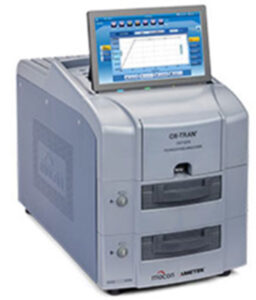
Ametek Ox-Tran 2/12 OTR Analyzer
- For transmission rate measurement a known concentration Test Gas (usually 100% Oxygen) is applied to one side of the barrier material to be tested and the other side is swept with an oxygen free Carrier Gas (nitrogen). The Test Gas (oxygen) is continuously admitted to bottom half of the cell and allowed to exit through an exhaust port.
- The Carrier Gas enters the top half of the cell. As Test Gas permeates the sample barrier it mixes with the Carrier Gas. The output side (exhaust) of the test cell is routed to an oxygen sensor. The amount of oxygen in the carrier gas is measured using the oxygen detector.
- The oxygen permeation measurement systems feature 2 independent cells with changeable horizontal test cartridges that allow a wide variety of sample sizes and types to be easily and accurately tested.
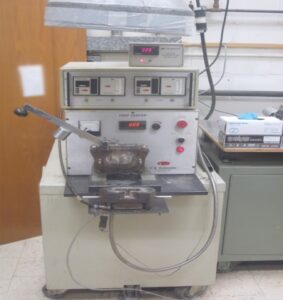
C. W. Brabender
- This apparatus is available for processing and mixing small batches of polymers, from dry powders to highly viscous melts, under electrically controlled temperatures of up to 400 °C at various operating speeds (up to 100 rpm, 7.5 hp).
- The types of mixers available include a 650-mL capacity head with fixed sigma blades and a dispersion trough for low viscosity fluids or dry powder blending; a 60/100-mL variable bowl capacity with exchangeable roller, cam and sigma blades and a ram closure with provision for inert-gas injection; and a 30-mL-capacity head with roller blades and a similar ram closure. The roller blades create intensive mixing and impose a strong kneading force.
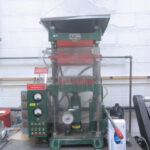
Carver Lab Press
This hydraulic heat press is available for compression molding resins into sheets at temperatures of up to 300 °C (570 °F) at a maximum force of 30 tons. Two chambers (four platens) are available to accommodate molds as large as 30 × 30 cm2 (12 × 12 in.).
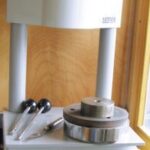
Kayeness D4001 Melt Index Tester
Melt flow provides information on the rate of flow of a polymer under certain load forces for a set amount of time. This rate can be used as an indirect measurement of molecular weight and viscosity.
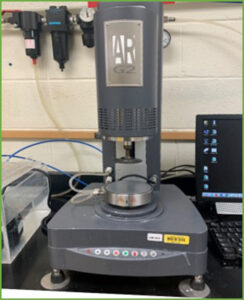
TA Instruments AR-G2
Rheometer measures both viscosity and viscoelasticity of fluids, semi-solids and solids. In a rheological measurement stress, strain (shear rate) are all calculated signals. The raw signals behind the scene are torque, angular displacement and angular velocity.
Viscosity- defined as a materials resistance to deformation and as a function of shear rate or stress with time and temperature dependence.
Viscoelasticity- is a property of a material that exhibits both viscous and elastic character.
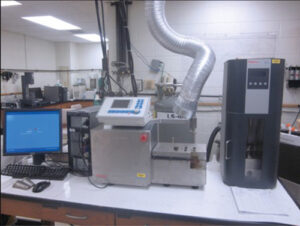
Thermo Fisher Scientific Haake Minilab II and Minijet
- Compounds small sample amounts of 7 cm3. This miniaturized, high-tech tool is perfect for research in material science, such as testing of new additives and the development of new formulations.
- The system is based on a conical, twin-screw compounder with an integrated backflow channel. By operating with 100% backflow, the extruder becomes a batch mixer with a well-defined residence time.
- This micro compounder can be used with co- or counter-rotating screws and is equipped with an inert gas flush system.
- HAAKE MINIJET- a small ram injection-molding system. Material consumption is reduced dramatically in comparison with conventional injection molding units
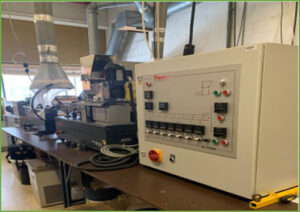
Thermo Fisher Scientific Prism TSE 16 TC
- This small twin-screw extruder is designed for bench-top operation. It includes pre-mixers, chill rolls, strand pelletizing lines, and an air-cooled face-cut system.
- The horizontally split barrels are quick to open, giving easy access to screws and process contact surfaces for configuration changes or cleaning. The barrel has additional ports for feeding solids and/or liquids, or for venting.
- A simple manual control panel houses controls and instruments to operate the extruder and feeders. Low maintenance, brushless, variable-speed AC motors drive the screws at up to 500 rpm. This twin-screw extruder can be used for research, development or small-scale production.
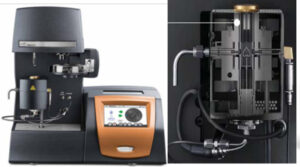
TA Instruments TGA-5500 Discovery
- Thermogravimetric Analysis (TGA) is a technique in which the mass of a substance is monitored as a function of temperature or time as the sample specimen is subjected to a controlled temperature program in a controlled atmosphere.
- A TGA consists of a sample pan that is supported by a precision balance. That pan resides in a furnace and is heated or cooled during the experiment. The mass of the sample is monitored during the experiment. A sample purge gas controls the sample environment. This gas may be inert or a reactive gas that flows over the sample and exits through an exhaust
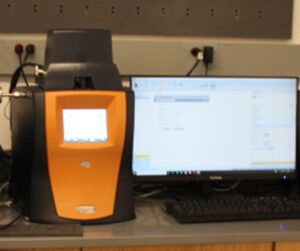
TA Instruments DMA 850
- A Dynamic Mechanical Analyzer (DMA) measures elastic and viscous behavior of a material as a function of time and temperature.
- DMA works on the principle of applying a force or a deformation to a sample, then sample’s response, which will be a deformation, or a force is measured.
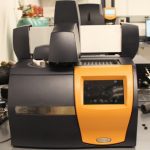
TA Instruments Discovery X3 DSC
- Understanding a material’s structure–property relationship is necessary when designing, processing, and utilizing a product. Differential Scanning Calorimetry (DSC)—measures endothermic and exothermic processes and is widely used to characterize a broad range of materials including polymers, pharmaceuticals, foods, biologicals, organic chemicals, and inorganic materials.
- The Discovery DSC X3 is a multi-sample differential scanning calorimeter allowing the simultaneous analysis of up to three samples. This provides unmatched flexibility from replicate testing for statistical analysis to validation/verification against a control sample for the ultimate in certainty.
- The DSC X3 is connected to liquid nitrogen cooling accessories and have a temperature range of -160°C to 450°C.